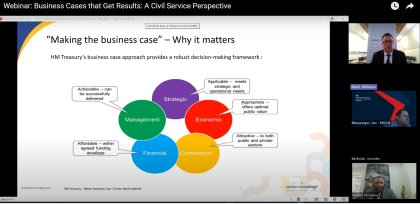What makes a business case truly effective in the public sector?
For many public servants, business cases can feel like complex paperwork—yet they are essential to making sound decisions about investment and public value. We recently explored this with Mark Williams, a seasoned public finance expert, who shared practical insights into what drives successful business cases that stand up to scrutiny and deliver real impact.
Why business cases matter
A business case is more than a formality—it is a vital decision-making tool. It brings together evidence, options, and stakeholder views to help organisations make informed choices that align with public priorities. More than that, it documents how decisions were made and ensures transparency and accountability to taxpayers and partners alike.
Mark emphasised the need to shift culture away from treating business cases as bureaucratic hurdles, and towards seeing them as living documents. When developed collaboratively with the right people, and updated throughout a project’s lifecycle, business cases help public bodies balance risks, costs, and benefits more effectively.
Clear and simple language is key. Mark’s advice? “If it’s not written down, it didn’t happen.” That means plain English, clear evidence, and anticipating that any business case might be made public.
When is a business case needed?
Not every decision requires a full business case, but there are clear moments where one is essential:
- Proposals involving significant spending or policy change
- Major procurements or contract renewals
- Investment approvals with financial or social impact
- Stages in programme or project governance
The principle is proportionality—smaller projects require lighter cases, larger initiatives need more detailed evidence and multiple approval stages.
The Five Case Model: A flexible framework
The UK public sector commonly uses the Five Case Model to structure business cases. This framework encourages comprehensive appraisal across five dimensions:
- Strategic case: Why is this needed? How does it support government or organisational objectives?
- Economic case: What are the options? Which delivers the best value for money considering benefits, costs, and risks?
- Commercial case: How will the procurement and contract be managed?
- Financial case: Is it affordable within current budgets? What funding sources exist?
- Management case: Can the project be delivered successfully, and are risks and controls in place?
Mark highlighted that the economic case is particularly important since public bodies focus on delivering societal benefits rather than profit. Using economic analysis helps translate outcomes like improved health or job creation into comparable values.
Developing the right business case for the situation
Business cases come in different shapes:
- A Business Justification Case suits simple procurements or operational changes.
- A Major Project Business Case involves multiple stages, building evidence progressively through Strategic Outline Case, Outline Business Case, and Full Business Case, with formal reviews at each stage.
- Programmatic cases support complex programmes made up of multiple linked projects.
These stages allow decision-makers to assess feasibility early, shortlist options carefully, and finalise plans with confidence, reducing risk along the way.
Collaboration is critical
Mark stressed the importance of involving the right stakeholders from the start, including:
- Economists and analysts to provide robust evidence
- Service users and requirement owners to ensure needs are met
- Finance and commercial specialists to advise on affordability and procurement
- Project managers and senior responsible owners (SROs) to lead delivery
- External partners or funders, where applicable
Engagement should be ongoing and transparent, with clear roles to avoid duplicated effort or conflicts. Including service users and communities helps ensure the business case truly reflects public needs.
Common challenges—and how to avoid them
Developing business cases is not without difficulties. Mark pointed out common pitfalls:
- Missing or poor-quality data can undermine confidence.
- Budget pressures may limit viable options.
- Stakeholder priorities may clash without early alignment.
- Unclear decision authority leads to delays or repeated work.
- Bias towards preferred options can cloud appraisal.
Early due diligence, clear governance, and structured workshops to explore options openly help mitigate these risks.
Measuring success beyond approval
A strong business case doesn’t end with funding approval. Monitoring benefits, costs, and risks throughout delivery is vital. Mark emphasised that success depends on:
- Defining clear, measurable outcomes linked to original objectives
- Establishing effective project and contract management
- Maintaining oversight through regular reporting and governance meetings
- Allocating resources for ongoing evaluation
This ensures the intended public value is realised and any issues addressed promptly.
Reflections from the session
For public servants new to business cases, Mark’s practical advice was simple but powerful:
- Use common sense and don’t hesitate to challenge assumptions.
- Collaborate early and keep communication open.
- Match the effort invested to the project’s complexity and risk.
- Learn from established guidance, frameworks, and past experiences.
- Treat business cases as evolving tools, not one-off documents.
At Civil Service College, we are committed to supporting public servants in mastering business case development to underpin transparent, accountable, and effective public investment.
Thank you to Mark Williams for sharing his expertise with us and to all our colleagues dedicated to improving public sector decision-making.

